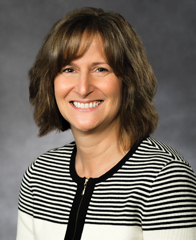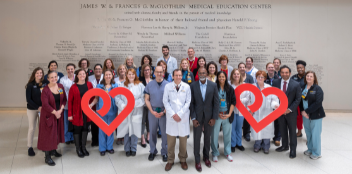Dr. Patricia Uber Assists Heart Patients

Each year that passes is a celebration for the patients of Patricia Uber, PharmD.
“My youngest patient was 13 days old. He’s now 15 years old,” she said. “He plays tennis and runs track and field for the Transplant Games of America.”
The patient was one of many she met while working for Dr. Mandeep Mehra, at the Ochsner Clinic’s busy Cardiomyopathy and Heart Transplantation Center in New Orleans, from 1997 to 2005. Surgical teams performed 50 to 60 heart transplants each year at the hospital, which was also involved in trials for the early heart pumps.
At the Ochsner Clinic, she was concerned by the mortality rates of African-American transplant patients; few survived more than two to three years. “A lot of them died by what we call antibody mediated rejection,” she said. “It was very difficult to watch.” Seeking answers, she was involved in pivotal studies exploring a new drug. “We changed our immunosuppression therapy from cyclosporine [a groundbreaking, highly effective drug for other groups] to tacrolimus, and we saw a dramatic improvement in the survival rates of African-Americans.”
She and a colleague left Ochsner to help Mehra build the heart transplant and pulmonary arterial hypertension programs at University of Maryland. In 2009, Mehra became editor of the prestigious Journal of Heart-Lung Transplantation, and Uber the executive editor—a position she has held ever since.
“Patricia Uber is an expert in the field of transplant pharmacotherapies and world-renowned in her work with the journal.” — Dr. Keyur Shah
Dr. Keyur Shah, who had met Uber when he was a fellow at Maryland, successfully recruited her to come to VCU Health in 2015. “Patricia Uber is an expert in the field of transplant pharmacotherapies and world-renowned in her work with the journal,” said Shah. “When the opportunity arose to recruit her to VCU Health, we thought it was a perfect match with her expertise and our intent on having a world-class advanced heart failure program.”
At VCU Health, Uber enjoys working with other team members to tackle the challenges of these complex patient populations. With transplant patients, “their immune systems are not normal and their medications are very specialized, so the interactions with other medications can have severe consequences,” she said.
Even a virus can wreak havoc on their systems. “What I explain to the patient is that they live the rest of their life walking a fine line between rejection and infection,” she said. The risk of rejection is highest in the first year. During this time, the patient is closely monitored through regular visits and biopsies. “That’s where we’re doing the most adjustments of their anti-rejection meds. If they can make it through the first six months to one year without any major rejection episode, then things are looking pretty good for what’s going to happen over the next 5,10, 15 years.”
Uber has celebrated birthdays and weddings with patients and likes to follow them through the years. “I think what I like the most about it is, you know them the whole way through their journey—the good and the bad,” she said. “It’s longitudinal care.”
Back to Spring-2018
Join our Pauley Consortium composed of patients, friends and advocates.

